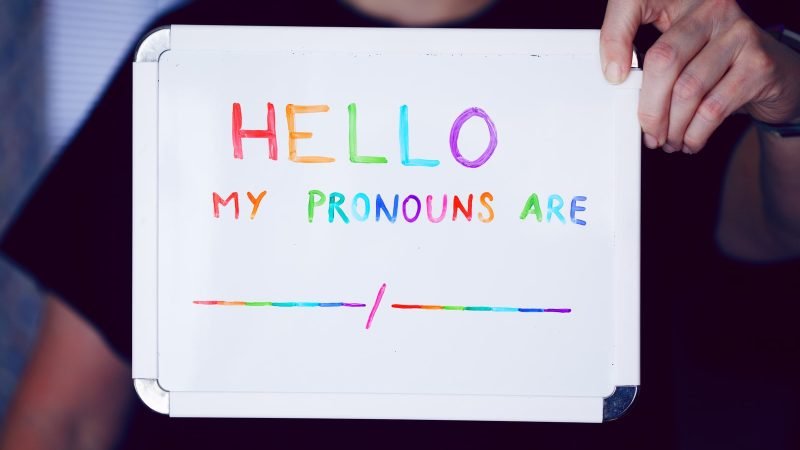Earlier this year I attended a small, local gathering of “theologically conservative” ministry leaders who were discussing the challenges of navigating transgenderism in the church. For anyone engaged in thoughtful ministry, especially ministry to youth or college students, these are essential conversations. A Gallup poll released in February 2022 noted that 20.8% of Gen Z Americans identify as LGBT+, and over one in ten of those 20.8% identify as transgender.1
One of the most practical questions Christians ought to be asking is how we should address individuals in this significant portion of the population. If we aren’t hiding under a rock, we will be increasingly meeting, working, and living with those who identify as transgender. Should we use their chosen pronouns?
At this meeting, I was shocked to hear about half of those present argue, even if tentatively, to affirm the use of pronouns not congruent with the sex of the person assigned at birth, as a form of “Christian hospitality.”
In his book Embodied, Preston Sprinkle argues that “Trans people typically view using their pronouns and chosen name as a basic courtesy and respect … Christians should build relational bridges instead of walls, and refusing to use someone’s pronouns might as well be a brick wall the height of Babel’s tower.”2
The underlying desire to show “hospitality” is commendable. The issue of pronouns seems so small, so trivial, and there are bigger fish to fry! How will they have ears to hear the gospel if we don’t build some kind of relationship with them!?
Paul wrote to the Corinthian church about another seemingly trivial matter: eating food sacrificed to idols. In Corinth, it was normal for most, if not all, animals to be sacrificed to idols before being butchered for food. Paul encouraged the church to recognize that an idol is nothing. Thus, because idols are nothing, it is perfectly acceptable to eat meat that has been sacrificed in idol worship. However, a Christian could, under no circumstances, join in the ritual sacrifices and cultural practices of idol worship. All this should be unsurprising.
Paul then writes that, in a meal with a non-Christian, a believer should feel free to eat whatever is put before him without raising questions. However, if someone in the gathering mentions that the meat had been offered in sacrifice, the Christian must abstain from eating the meat. Why? Not because it is inherently sinful to eat meat sacrificed to idols, but for the sake of the conscience of the unbelievers.
“If an unbeliever invites you to a meal and you want to go, eat whatever is put before you without raising questions of conscience. But if someone says to you, “This has been offered in sacrifice,” then do not eat it, both for the sake of the one who told you and for the sake of conscience. I am referring to the other person’s conscience, not yours.”
1 Corinthians 10:27-29a (NIV)
Though it may seem trivial, Paul’s point is, don’t eat meat if a non-believer may think you are sanctioning his idolatry. Any action ought to be abstained from if it may lead someone to think that Christians affirm their lifestyle of idol worship.
I’m sure some of the Corinthians had good intentions to build bridges instead of walls with their unbelieving family members, friends, and coworkers, in order to see them repent and trust in Christ. But a bridge built on a foundation of presumed acceptance of idol worship would be incapable of bearing the weight of true conversion. No real bridge building is done.
Today, most people are not sacrificing to physical idols. But the immaterial idols of self, sex, and safety reign supreme. Affirming the pronouns of those who are transgender outwardly sanctions their idolatry. False pronouns and genders are nothing, just as false gods are nothing. Christians cannot sanction idol worship, and likewise we cannot sanction worshiping the idol of self in false pronouns.
The question of building bridges between the church and the LGBT+ community is an important one to wrestle with, if we want to reach the next generation with the gospel. Those who are living in sinful lifestyles are not enemies to be defeated, but lost sheep without a shepherd. However, to affirm their pronouns will not build the bridges they need but only confuse their consciences.
- Jeffrey M. Jones, “LGBT Identification in U.S. Ticks Up”. https://news.gallup.com/poll/389792/lgbt-identification-ticks-up.aspx ↩︎
- Preston Sprinkle, Embodied: Transgender Identities, the Church & What the Bible Has to Say (Colorado Springs: David C. Cook, 2021): 206. ↩︎



Well said and written with a gracious and free spirit that cares about engagement and fidelity to biblical revelation/truth. Thanks, Nick!
I agree with you Nick. Thank you for sharing these useful insights.
In all, allow the Holy Spirit guide the interactions. Just as Jesus Christ reached out to those who were literally termed as ‘outcasts’ via different methods and they were graciously transformed, so also must we. Discernment/discretion is key for any effective evangelism/soul-winning.